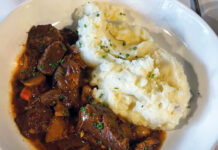
|
A few of the diners and most of the restaurant staff do “Is-that-who-I-think-it-is?” double takes as we step into the trending, relatively new Dumbwaiter Restaurant for lunch. Chef John Besh’s familiarity stems from four cookbooks, his two national television shows, 12 acclaimed restaurants and countless guest TV appearances. His easy demeanor and relaxed attitude belie the fact that he’s a U.S. Marine, a father of four and has a hectic schedule that must accommodate hunting season. In between trips to L.A. and New York, Besh spent the day with the MB staff cooking, teaching, eating and entertaining with his philosophies on food.
Your previous cookbooks have been beautiful volumes with fantastic recipes. How is your new cookbook, “Besh Big Easy, ” different?
I tried to create recipes that are a little bit more accessible for the home cook and have a New Orleans focus that we don’t see on menus quite as often. Over the years, food has really become complicated and intense. But as I’ve grown, and as I’ve aged, I’ve really done away with the far-flung ingredients. I’m hoping that this cookbook will be like the ones that sit on your mom’s shelf — those cookbooks that have been used and used and used.
What made you decide to go in that direction?
We’re becoming a little bit more mature and confident in the South; in particular, the Gulf Coast. Back in the day, 10 or 20 years ago, you wouldn’t see menus like you see here. Everything had to be fancy. We had to have sauce that people couldn’t understand or pronounce. We had to have window treatments and we would walk into a restaurant like this with jackets, not as casual as we are. We’ve just become so confident that we’re cooking food from our hearts. Simple foods. It’s circumstance without the pomp. Yes, we will always have fine dining because you’ll always have special occasions, but I think that trend is allowing people to open up in spaces like this.
You started a foundation all about maintaining that New Orleans culinary heritage. How do you do that?
The John Besh Foundation provides scholarships, grants and loans to individuals in the New Orleans community with the passion, creativity and knowledge to enact change in New Orleans and Louisiana.
After Hurricane Katrina, many predicted that the city — and its proud culinary traditions — would never be the same. Instead, New Orleans rallied, and the return of po’boys and gumbo became a marker of that resurgence. Likewise, the people of New Orleans will find their best future when we come together around a common table, something that The John Besh Foundation proposes to foster.
Like food, which can represent sustenance and exuberance, relationships and new beginnings, The John Besh Foundation builds up communities and encourages new growth. It celebrates New Orleans’ past by building a lasting community — a culinary world — that can revel in what exists while sustainably cultivating further progress, talent and opportunity.
Everyone knows the Gulf Coast is rich in amazing seafood. What other ingredients from around the area inspire you?
You ever been to the farmers market? The Chilton County peaches are in season. There’s Louisiana citrus to the Ponchatoula strawberries. Even from this little area, what Baldwin County has to offer. At this time of year, the satsumas start coming in, and there’s not a better citrus on earth. That’s the stuff that really excites me.
Speaking of fresh ingredients, don’t you raise your own cattle and farm your own vegetables?
When I started out, we didn’t have a farmers market, so we started farming. I come from generations of farmers, and I’ve always respected that. I don’t know squat about it, and I made a lot of mistakes, lost a lot of money and crops. I finally came across farmers willing to take that chance — step out of their comfort zone of bell peppers and okra to start growing cavolo nero kale for me, picking petite vegetables instead of the long ones that are woody and crappy tasting.
And so through this evolution, if I wanted organic beef, we just went out and started doing it. We bought a herd of Charolais beef cattle and instead of sending them off to the Midwest to be finished, we finished them on spent Abita beer grain, which is 20 percent protein, a lot of carbs. They were probably drunk at the time, and the cows seemed to really enjoy it. This led to a lot of collaborations — Dave Matthews’ wife has a doctorate in animal husbandry. She sent down 12 of their Mangalitsa pigs that we had never had in the South before. That quickly became about 136 of them, and so then that started growing.
But around every bend, we found that we couldn’t really do this whole big thing by ourselves. It was just killing us. We needed somebody who really knew what they were doing, so we found farmers to invest in. That’s what led us to creating our Milk Money micro loan program for area food producers. These people who needed access to capital, they weren’t getting it through traditional means, and we wanted to make it available at no interest. So, we set up this fund that does just that. That led us to all these farmers needing more processing facilities, so Dicky Brennan and I bought a slaughterhouse and purchased all the poultry equipment from the LSU Agricultural Center. Our farmers no longer had to go to Mississippi to get things processed and then drive the opposite direction. It was a lot more cost effective to the chef and for the farmer.
That’s an incredible journey. How can home chefs take advantage of these types of things without starting a farm or raising their own beef?
Support your local farmers market. Get to know the people that are growing it and create a relationship. Get to know where your shrimp come from. We’re quickly losing all of our shrimp production facilities — there’s only a few left down here; Bon Secour and those areas in south Alabama. Buying Gulf shrimp makes a huge difference. Buying Gulf crab. Buying domestic crawfish. Just those simple little acts — if we all spent our money there, we would be shoring up our local economy. I think economics kind of runs the board here and in my little area, if my farmers aren’t making money, they’re not going to continue to farm, and future generations won’t farm. It’s that simple. Same thing with fishers and shrimpers and crabbers and oyster people. So that’s what its all about — spending a little bit more locally and it has such a profound impact locally.
What’s the difference between creole and Cajun cooking?
It’s a big one. Cajun cooking didn’t have the international influences that the port city cuisine that we refer to as creole had. We have obviously the French, the Spanish, the African influences. We have the influences of the Germans, the Italians, the Croatians. Now the Vietnamese. People also came to New Orleans in an effort to assimilate into that franco-afro-spanish culture. And I say that because you didn’t have that influx of people into Cajun country where, really until World War I, they had been almost untouched. It wasn’t until World War I and the need for south Louisiana oil that the Cajuns had ever—they had always lived kind of cloistered. And so their cooking was very simple. Even the dishes that we share—the gumbo, a true Cajun gumbo is going to be very light. It’s very much a rice-driven cuisine where the cuisine of New Orleans has so many more international influences—pastas, potatoes, and all the different ingredients we have at our fingertips. Creole tends to be much more complex.
What are the most important factors to operating a successful restaurant?
You’ve got to have passion. You’ve got to have a firm understanding of business. People come to see me to have a good time. All I need to do is create the atmosphere for people to have the best time that they can have. The food has to match. The drinks have to match. I have to manage my labor, manage my food costs, manage my beverage costs, and then, if everything’s just perfect out there, I get to scrape a meager living out of it.
How does one make his or her restaurant stand out?
Through heart and passion for their guests. People dine out a lot. They come to New Orleans for that purpose. They want to go to a place that makes them feel special. As much as I wish that I could say it’s all about this food or this recipe, it’s really about the passion of the chef. We try to hire people in our group with the propensity to serve others
Do you think you’ll ever retire?
I feel like I’m kind of retired. Like I’m doing what I want to do.
The John Besh Foundation
Each year, John Besh’s nonprofit provides five New Orleans youths with scholarships for culinary school, as well as internships, mentors and real-world restaurant experience. The Milk Money program, connecting Southern farmers with the financial backing necessary to produce a quality crop, also falls under The John Besh Foundation. To learn more about the opportunities available or to donate to the organization, visit johnbeshfoundation.org.
November 11: Christmas Jubilee Preview Gala
Mobile Convention Center • 1 S Water St.
7 p.m. – 10 p.m. Chef John Besh will wow guests with a cooking demo right here in Mobile! Plus, get a sneak peek at the holiday shopping while enjoying tasty hors d’oeuvres and wine and beer. Cocktail attire. Tickets are $60. Ages 21 and up. Sponsored by the Junior League of Mobile.
interview by Bryan Starr • photo by Elizabeth Gelineau





